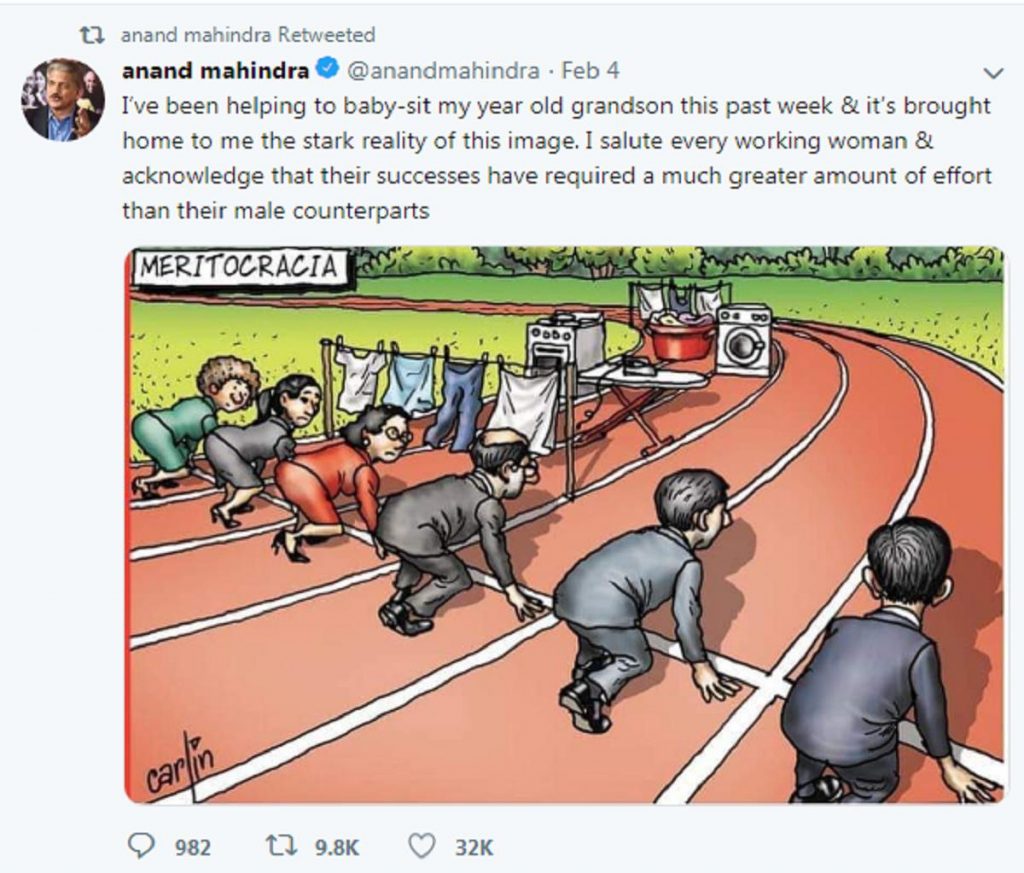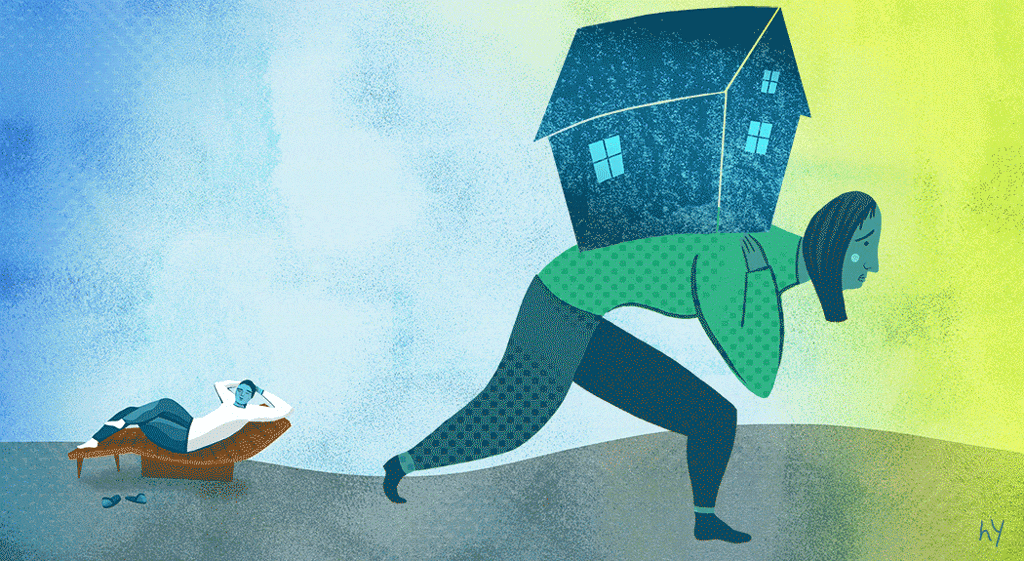Editor’s Note: This month, that is September 2020, FII’s #MoodOfTheMonth is Boys, Men and Masculinities, where we invite various articles to highlight the different experiences of masculinity that manifest themselves in our everyday lives and have either challenged, subverted or even perpetuated traditional forms of ‘manliness’. If you’d like to share your article, email us at pragya@feminisminindia.com.
A couple of years ago, a leading industrialist tweeted a cartoon of men and women on a racing track, in get-set-go position at the starting line. The men had an unhindered track in front of them. The women on the other hand, had clothes on lines, washing machines, ironing boards clogging their way. He applauded the women for how much they take on, at home and at work. He was applauded in return. Wah! Great soul! People retweeted with all the right hashtags, clicked their tongues and went to sleep. The next morning, while they checked likes and shares, they were too preoccupied to notice that breakfast had magically appeared on the table.

The men of today’s India, especially the English-speaking, corporate-working, urban, educated ones, are the first generation to have achieved gender equality. Unlike their fathers, they never ask their wives and girlfriends to not work. In fact, they encourage them. Double incomes are good for the household! Their partners can do whatever, wear whatever, drink whatever. They even celebrate their partners.
But for her, what would I have been? She manages everything. Women are multi-taskers. They have much higher EQ than men. Men, not as well-versed in English or urban or educated, are catching up fast. The Prime Minister is bachaofying and padhaofying the betis. Gunjan Saxena is slaying the Pakistanis. Women’s Day ads show bosses decorating cabins for female colleagues back from maternity. Oh chachu, all is well!
All the praising and gifting and tweeting isn’t going to make them move their backsides and share the workload at home. In our jugaad economy, there’s always an easy solution! Pay the bai. Pay Swiggy. Pay a private tutor. What’s the point of corporate money if you can’t pay your way into patriarchy? And what’s the point of MBA if you can’t brand yourself a ‘feminist’ at the same time?
Where things aren’t exactly equal, it’s the woman’s choice. She didn’t want to go back to work yaar; her job didn’t exactly pay much. She shops till she drops, but truth is she shops for the entire family. She loves doing teej and karva chauth fasts; she’s traditional like that. She bears the sole ownership of her actions. If this isn’t feminism, what is?
Where women start complaining, they’re ‘finicky’ and OCD (a term most Indians didn’t know existed until a few years ago). Who asked her to clean the house? Did I? Not once! Who asked her to cook, keep track of groceries, count our calories? I toh said order food, hire a cook, leave it for the bai. Who asked her to stay up all night to decorate the house for the child’s birthday party, to host a dinner for all our friends and cook five dishes?
Also read: Men In Feminism: A Positive Vision For Feminist Politics
Their fathers asked their wives to not work, not study, wear traditional clothes, take care of the children and in-laws. They did it openly and without artifice. The sons though, are on a slippery slope. All the praising and gifting and tweeting isn’t going to make them move their backsides and share the workload at home. In our jugaad economy, there’s always an easy solution! Pay the bai. Pay Swiggy. Pay a private tutor. What’s the point of corporate money if you can’t pay your way into patriarchy? And what’s the point of MBA if you can’t brand yourself a ‘feminist’ at the same time?
Their fathers were also more equitable about gender roles, albeit in a perverse way. While they issued edicts to their wives, they took on their shoulders everything external to the home – jobs, finances, bills, investments, properties, accounts, taxes. There’s still a generation of older women who have no idea what to do when they walk into a bank. But the sons are slimier.

In the name of equality, they’ve palmed off the outside work to the women too. Younger women today manage finances, businesses, investments, properties, home repairs, holidays. And yet, the equal workload outside of home has not mandated a similar equal workload inside the home. The kitchen is still the sanctuary of the woman. No matter how badly she sucks at keeping home, it’s still her domain. It’s her choice na? I toh said let’s get everything off an app.
And while some men may and do share some of these, it’s never the full deal, never their sole responsibility. They are happy to help, except for when they’re tired, or the cricket match is on TV, or they’re going out to meet their pals, or their mummy-papa are coming (what will they think of their son doing housework?). On all other days, they’re doing something-something na?
The truth is – most men have no clue what it takes to run a functional household, leave alone one that is beautiful and nurturing. And an app takes you only so far. Organise groceries, instruct the domestic worker, keep an eye on the cook (if you have one), step in on days they’re absent, tidy up, do the laundry on time, fold up the linen, submit meter readings, pay the bills, check why the drainpipe is stinking, wipe photo frames, dust cobwebs, water plants, take woollens out when the weather turns…. The list is endless.
And while some men may and do share some of these, it’s never the full deal, never their sole responsibility. They are happy to help, except for when they’re tired, or the cricket match is on TV, or they’re going out to meet their pals, or their mummy-papa are coming (what will they think of their son doing housework?). On all other days, they’re doing something-something na? Fine, it takes a few reminders, but come on yaar! Didn’t he make biriyani on Sunday? Didn’t you see his wife post on Facebook with twenty hearts? Hubby made lunch <3.
Also read: Why I Will Not Stop Saying ‘Men Are Trash’ & Other…
The pandemic is a bitch. Truly. The bais and didis stopped coming during the lockdown. So the wife asked him to fill drinking water from the Aquaguard. But his mood was off that day, so he didn’t fill. She nagged and nagged. He lost his temper and declared – chal koi na, I will not drink water only. Later he saw she had filled all the bottles. He felt a bit guilty but didn’t let it show, of course. It was her choice after all. When he got thirsty and took a sip, she rolled her eyes but left him alone. She’s tired of nagging. All the difficult conversations have been had many times.
Her choice na?
Santanu Bhattacharya works in the education sector, having previously worked with the United Nations and Teach For India. He studied Public Policy at Oxford University and has previously written for the book Revealing Indian Philanthropy and the magazine Oxford Student. He was the winner of the UK Chapter One Promotions Short Story Competition in 2012. He has lived in Bangalore, Kolkata, Sikkim, Delhi and Mumbai, and currently lives in London. He is working on getting his first novel published, which was longlisted for the BPA First Novel Award recently.
Featured Image Source: Feminism In India




